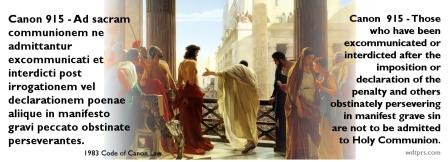The Canonical Defender, Prof. Ed Peters, is back at it after his synodal sojourn in Rome.
Catholics, Communion, and Controversies
by Dr. Edward PetersControversies over participation in holy Communion by Catholics publicly at odds with Church teaching cannot be usefully aired until the norms governing Catholic participation in holy Communion are first understood. The editors at First Things kindly gave me a chance to set out those norms for readers in their November 2012 issue. My essay, “Fencing the Altar”, is available on-line.
If I may quote myself:
Participation in Holy Communion is achieved by two related but distinct acts: the action of a member of the faithful in seeking Communion (reception) and the action of the minister in giving Communion (administration). These two actions are not only performed by different persons, they are governed by different canon laws. Virtually all confusion over Communion can be traced to the failure to keep these two actions distinct.
and,
[A] clear recognition of the fundamental differences between canon 916 on the reverent reception of the Eucharist and canon 915 on a minister’s withholding of Holy Communion is essential in assessing these cases. So too is recognizing that ambiguous cases must be decided in favor of reception of the Sacrament, even at the risk of sacrilege, while proven cases of public unworthiness as understood by Church law must result in withholding the Sacrament, even at the risk of public outcry. [!] Both outcomes are required upon pain of dereliction of ministerial duties in regard to participation in the Eucharist.
Canon 915.



































Speaking of First Things and communion, perhaps Dr. Peters might comment on this rather scandalous On the Square post written by the Lutheran minister Russell Saltzman:
So what constitutes “… proven cases of public unworthiness as understood by Church law….”?
I have not had an opportunity, yet, to read the referenced article. Perhaps it is in there.
As always, Ed Peters is the awesome.
“So what constitutes “… proven cases of public unworthiness as understood by Church law….”?
I have not had an opportunity, yet, to read the referenced article. Perhaps it is in there.”
Good question. Judging by results, there is no such animal.